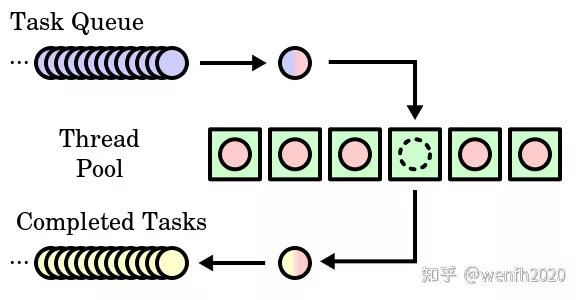C++ 有什么推荐的线程池库吗?…
1. 概述
Github 上有个轻量级线程池,核心源码不超过百行^_^,简单易用,README 也写得很详细;
缺点是数据拷贝有点多,一般对性能不是特别苛刻的应用场景使用应该没啥问题。

2. 源码
考虑到有些同学上不了 Github,所以把源码贴到下面来了。能上的同学,直接通过链接访问 Github 即可。
- 安全队列。
1
2
3
4
5
6
7
8
9
10
11
12
13
14
15
16
17
18
19
20
21
22
23
24
25
26
27
28
29
30
31
32
33
34
35
36
37
38
39
40
41
42
43
44
#pragma once
#include <mutex>
#include <queue>
// Thread safe implementation of a Queue using an std::queue
template <typename T>
class SafeQueue {
private:
std::queue<T> m_queue;
std::mutex m_mutex;
public:
SafeQueue() {}
SafeQueue(SafeQueue& other) {}
~SafeQueue() {}
bool empty() {
std::unique_lock<std::mutex> lock(m_mutex);
return m_queue.empty();
}
int size() {
std::unique_lock<std::mutex> lock(m_mutex);
return m_queue.size();
}
void enqueue(T& t) {
std::unique_lock<std::mutex> lock(m_mutex);
m_queue.push(t);
}
bool dequeue(T& t) {
std::unique_lock<std::mutex> lock(m_mutex);
if (m_queue.empty()) {
return false;
}
t = std::move(m_queue.front());
m_queue.pop();
return true;
}
};
- 线程池。
1
2
3
4
5
6
7
8
9
10
11
12
13
14
15
16
17
18
19
20
21
22
23
24
25
26
27
28
29
30
31
32
33
34
35
36
37
38
39
40
41
42
43
44
45
46
47
48
49
50
51
52
53
54
55
56
57
58
59
60
61
62
63
64
65
66
67
68
69
70
71
72
73
74
75
76
77
78
79
80
81
82
83
84
85
86
87
88
89
90
91
92
93
94
95
96
97
98
99
100
#pragma once
#include <functional>
#include <future>
#include <mutex>
#include <queue>
#include <thread>
#include <utility>
#include <vector>
#include "SafeQueue.h"
class ThreadPool {
private:
class ThreadWorker {
private:
int m_id;
ThreadPool* m_pool;
public:
ThreadWorker(ThreadPool* pool, const int id) : m_pool(pool), m_id(id) {}
void operator()() {
std::function<void()> func;
bool dequeued;
while (!m_pool->m_shutdown) {
{
std::unique_lock<std::mutex> lock(
m_pool->m_conditional_mutex);
if (m_pool->m_queue.empty()) {
m_pool->m_conditional_lock.wait(lock);
}
dequeued = m_pool->m_queue.dequeue(func);
}
if (dequeued) {
func();
}
}
}
};
bool m_shutdown;
SafeQueue<std::function<void()>> m_queue;
std::vector<std::thread> m_threads;
std::mutex m_conditional_mutex;
std::condition_variable m_conditional_lock;
public:
ThreadPool(const int n_threads)
: m_threads(std::vector<std::thread>(n_threads)), m_shutdown(false) {}
ThreadPool(const ThreadPool&) = delete;
ThreadPool(ThreadPool&&) = delete;
ThreadPool& operator=(const ThreadPool&) = delete;
ThreadPool& operator=(ThreadPool&&) = delete;
// Inits thread pool
void init() {
for (int i = 0; i < m_threads.size(); ++i) {
m_threads[i] = std::thread(ThreadWorker(this, i));
}
}
// Waits until threads finish their current task and shutdowns the pool
void shutdown() {
m_shutdown = true;
m_conditional_lock.notify_all();
for (int i = 0; i < m_threads.size(); ++i) {
if (m_threads[i].joinable()) {
m_threads[i].join();
}
}
}
// Submit a function to be executed asynchronously by the pool
template <typename F, typename... Args>
auto submit(F&& f, Args&&... args) -> std::future<decltype(f(args...))> {
// Create a function with bounded parameters ready to execute
std::function<decltype(f(args...))()> func =
std::bind(std::forward<F>(f), std::forward<Args>(args)...);
// Encapsulate it into a shared ptr in order to be able to copy
// construct / assign
auto task_ptr =
std::make_shared<std::packaged_task<decltype(f(args...))()>>(func);
// Wrap packaged task into void function
std::function<void()> wrapper_func = [task_ptr]() { (*task_ptr)(); };
// Enqueue generic wrapper function
m_queue.enqueue(wrapper_func);
// Wake up one thread if its waiting
m_conditional_lock.notify_one();
// Return future from promise
return task_ptr->get_future();
}
};
- 测试源码。
1
2
3
4
5
6
7
8
9
10
11
12
13
14
15
16
17
18
19
20
21
22
23
24
25
26
27
28
29
30
31
32
33
34
35
36
37
38
39
40
41
42
43
44
45
46
47
48
49
50
51
52
53
54
55
56
57
58
59
60
61
62
63
64
65
66
67
68
69
70
#include <iostream>
#include <random>
#include "../include/ThreadPool.h"
std::random_device rd;
std::mt19937 mt(rd());
std::uniform_int_distribution<int> dist(-1000, 1000);
auto rnd = std::bind(dist, mt);
void simulate_hard_computation() {
std::this_thread::sleep_for(std::chrono::milliseconds(2000 + rnd()));
}
// Simple function that adds multiplies two numbers and prints the result
void multiply(const int a, const int b) {
simulate_hard_computation();
const int res = a * b;
std::cout << a << " * " << b << " = " << res << std::endl;
}
// Same as before but now we have an output parameter
void multiply_output(int& out, const int a, const int b) {
simulate_hard_computation();
out = a * b;
std::cout << a << " * " << b << " = " << out << std::endl;
}
// Same as before but now we have an output parameter
int multiply_return(const int a, const int b) {
simulate_hard_computation();
const int res = a * b;
std::cout << a << " * " << b << " = " << res << std::endl;
return res;
}
int main(int argc, char* argv[]) {
// Create pool with 3 threads
ThreadPool pool(3);
// Initialize pool
pool.init();
// Submit (partial) multiplication table
for (int i = 1; i < 3; ++i) {
for (int j = 1; j < 10; ++j) {
pool.submit(multiply, i, j);
}
}
// Submit function with output parameter passed by ref
int output_ref;
auto future1 = pool.submit(multiply_output, std::ref(output_ref), 5, 6);
// Wait for multiplication output to finish
future1.get();
std::cout << "Last operation result is equals to " << output_ref
<< std::endl;
// Submit function with return parameter
auto future2 = pool.submit(multiply_return, 5, 3);
// Wait for multiplication output to finish
int res = future2.get();
std::cout << "Last operation result is equals to " << res << std::endl;
pool.shutdown();
return 0;
}
3. 缺点
3.1. 问题
缺点非常明显,实际应用中,线程执行函数的参数拷贝次数有点多。
1
2
3
4
5
6
7
8
9
10
11
12
13
14
15
16
17
18
19
20
21
22
23
24
25
26
27
28
29
30
31
32
33
34
35
36
37
38
39
40
41
42
43
44
45
46
// g++ -g -O0 -std=c++11 test.cpp -lpthread -o t && ./t
#include <iostream>
#include "thread_pool.h"
class A {
public:
A() {
std::cout << "A()\n";
}
A(const A&) {
std::cout << "A(const A&)\n";
}
A(A&&) {
std::cout << "A(A&&)\n";
}
void f() const {
std::cout << "thread work\n";
}
};
void test(ThreadPool& pool, const A& a) {
std::cout << "submit\n";
auto r = pool.submit([=]() {
a.f();
});
r.get();
}
int main(int argc, char* argv[]) {
ThreadPool pool(1);
pool.init();
A a;
test(pool, a);
pool.shutdown();
return 0;
}
// 输出:
// A()
// submit
// A(const A&)
// A(const A&)
// A(const A&)
// A(const A&)
// thread work
如果执行函数传参为引用,效果要好很多,但是把引用传到多线程中去,貌似不安全啊~~~。
下面源码,如果调用了 submit 后,不调用
r.get进行等待,那么函数生命期结束后,引用指向的变量实体就会被销毁,而在线程内,引用变量可能继续被使用,这是危险的。
1
2
3
4
5
6
7
8
9
10
11
12
13
void test(ThreadPool& pool, const A& a) {
std::cout << "submit\n";
// 修改 ‘=’ 为 ‘&a’
auto r = pool.submit([&a]() {
a.f();
});
r.get();
}
// 输出:
// A()
// submit
// thread work
3.2. 问题分析
现在把 submit 函数影响拷贝的地方抽取出来,定位问题。
通过工具 cppinsights 查看 lambda 的模板实例化源码:
lambda 匿名类对象(__lambda_32_12)成员 const A a;,在程序传递过程中不停地发生拷贝。
原因:线程池中 submit 函数直接和间接地多次使用 std::bind,导致执行函数传递的参数多次发生拷贝。

拷贝具体位置:
- 创建 lambada 匿名函数对象。
- 调用 std::bind。
- std::bind 返回变量赋值给左值变量。
- 创建回调任务:std::packaged_task 内部实现有 std::bind 调用。
- 测试源码。
1
2
3
4
5
6
7
8
9
10
11
12
13
14
15
16
17
18
19
20
21
22
23
24
25
26
27
28
29
30
31
32
33
34
35
36
37
38
39
40
41
42
43
44
45
46
47
48
49
50
// g++ -g -O0 -std=c++11 test.cpp -lpthread -o t && ./t
#include <functional>
#include <future>
#include <iostream>
#include <thread>
class A {
public:
A() {
std::cout << "A()\n";
}
A(const A&) {
std::cout << "A(const A&)\n";
}
A(A&&) {
std::cout << "A(A&&)\n";
}
void f() const {}
};
template <typename F, typename... Args>
auto submit(F&& f, Args&&... args) -> void {
// std::bind 拷贝参数。
// std::bind 返回赋值给 func,产生二次拷贝。
std::function<decltype(f(args...))()> func =
std::bind(std::forward<F>(f), std::forward<Args>(args)...);
// 创建 std::packaged_task 回调对象,内部封装有 std::bind,再次拷贝参数 ^_^!。
auto task_ptr =
std::make_shared<std::packaged_task<decltype(f(args...))()>>(func);
std::function<void()> wrapper_func = [task_ptr]() { (*task_ptr)(); };
}
void f2(const A& a) {
submit([=]() {
a.f();
});
}
int main(int argc, char* argv[]) {
A a;
f2(a);
return 0;
}
// 输出:
// A()
// A(const A&)
// A(const A&)
// A(const A&)
// A(const A&)
- 模板实例化代码。
1
2
3
4
5
6
7
8
9
10
11
12
13
14
15
16
17
void f2(const A& a) {
class __lambda_32_12 {
public:
inline /*constexpr */ void operator()() const {
a.f();
}
private:
const A a;
public:
__lambda_32_12(const A& _a)
: a{_a} {}
};
submit(__lambda_32_12{a});
}
- 如果匿名函数改为
引用情况就不一样了,匿名函数对象的成员变成了引用const A& a;,引用变量在程序内部传递不会产生拷贝。
1
2
3
4
5
6
7
8
void f2(const A& a) {
submit([&a]() {
a.f();
});
}
// 输出:
// A()
- 模板实例化代码。
1
2
3
4
5
6
7
8
9
10
11
12
13
14
15
16
17
void f2(const A& a) {
class __lambda_35_12 {
public:
inline /*constexpr */ void operator()() const {
a.f();
}
private:
const A& a;
public:
__lambda_35_12(const A& _a)
: a{_a} {}
};
submit(__lambda_35_12{a});
}
4. 小结
- C++11 实现的线程池实现非常精巧优雅,虽然有缺点,瑕不掩瑜。
- 线程池内部直接间接地使用 std::bind,使得任务执行函数的参数可能会被多次拷贝,这也是性能与代码简洁之间的一种妥协。


